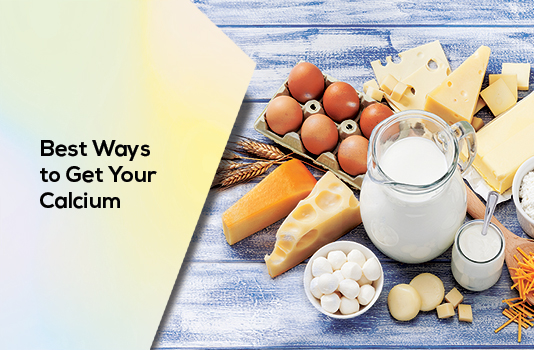Calcium is an important mineral for our body. It helps not only in building bones and keeping them healthy but also allows our blood to clot, our muscles to bond, and our heart to beat.
Deficiency of Calcium can lead to osteoporosis, weak bones, dental problems, brittle nails, and various other issues.
The recommended calcium intake ranges from 700 – 1000 mg/day with higher calcium requirements for children and during pregnancy.
While a glass of milk is the common answer to calcium intake, many fruits, vegetables, nuts and seeds are also good sources of calcium.
If you’re lactose intolerant or simply don’t get enough calcium from your daily diet, consider adding the below food items to receive your calcium without breaking a bone –
1. Seeds
Although seeds can’t make up your entire diet, they can be included in salads, made into laddoos, and added in curries regularly.
Til ka laddoo has been in nursing mothers’ diet in India for a long time. The key reason being calcium content in the seeds.
A tablespoon of sesame seeds contains about 90 mg of calcium, which means a quarter cup of natural sesame seeds is as good as a cup of milk.
A handful of sunflower seeds contains about 30 ml of milk’s value.
Chia seeds are your best friends if you are vegetarian or vegan. They are not only a good source of calcium but an excellent source of another essential nutrient – Omega-3 Fatty Acids. 100 g of chia seeds contains about 630 mg Calcium.
2. Yogurt/Curd
A simple meal of curd rice is not only good for a leaky gut but provides the required calcium to the body as well.
Yogurt and curd both are good sources of calcium.
You don’t need to look for exotic yogurt brands to fulfill your calcium requirement, just half a bowl of home-set Dahi (curd) is good enough probiotic to strengthen your gut health and provide calcium.
A 100 g serving of curd has approximately 85 mg calcium and 100 g of Yogurt can contain about 100 – 200 mg calcium.
3. Chickpeas and Black Chana
Roasted and ground black chana are good sources of Calcium and protein.
When consumed in boiled form, each average cup provides 80 mg of calcium.
One and a half cup of Kabuli chana or Chickpeas contains about 315 mg of calcium.
4. Cauliflower Leaves
Cauliflower leaves are considered to be the richest source of calcium among vegetables.
It is a rich source of Calcium, Vitamin K, and iron.
A 100 g serving of cauliflower leaves has approximately 600 mg of calcium in it.
5. Almonds
Almonds are quickly framing a new tale of ‘a handful of almonds a day, keeps the doctor away’.
Almonds are a good source of calcium along with Vitamin E, Omega-6 fatty acids, fiber, and protein.
Starting your day with soaked almonds not only helps with stronger bones but also helps in keeping your skin supple and hair shiny.
Almonds contain 264 mg calcium per 100 g of serving
6. Fruits
Citrus fruits are a great source of vitamin C as well as calcium. In fact, oranges are one of the best sources of calcium.
Each medium-sized orange contains about 65 mg calcium.
You can include raspberries, blackcurrants, and blackberries in your diet as well. However, don’t consume them with dairy. The dairy neutralizes the calcium in the berries.
7. Fenugreek Leaves and Seeds
You might have heard about fenugreek with its more common name – methi.
Methi leaves find their presence in Indian curries, dal, rice, paratha, and various snack varieties.
Primarily used for providing aroma to your food, fenugreek leaves are good sources of calcium.
A serving of 100 g fenugreek leaves contains as much as 150 mg calcium.
Methi seeds or methi dana, another household Kitchen ingredient contain approximately 180 mg of calcium per 100 g serving.
8. Sweet Potatoes
Sweet potatoes are a rich source of Vitamin C, E and A and are low fat in nature.
One large sweet potato contains about 70 mg of Calcium
9. Okra or Bhindi
Apart from Calcium, Okra or bhindi are a great source of protein, zinc, and fiber.
A single cup of raw okra contains about 80 mg of calcium
10. Crab, Black/White Pomfret
Crabs are one of the richest sources of calcium. A 100 g serving of crab meat contains about 1600 mg calcium.
If crabs are not your choice of delicacy, you can replace it with pomfret fish.
The black variety of pomfret contains more calcium than the white variety, but both contain at least 200 mg calcium per 100 grams of fish.
11. Figs – Dried/ Raw
Figs (Anjeer) are a great source of fiber, Vitamin B6 and minerals like calcium, potassium, magnesium, etc.
Although difficult to procure in a typical grocery store, raw figs are a richer source of calcium than dried figs. If you can find in your local market, don’t forget to bring a few to your home.
1 raw fig contains 50 mg of calcium, while 1 dried fig provides approximately 30 mg of calcium.
8 dried figs can provide up to 250 mg of calcium, almost equivalent to a glass of milk’s value.
Concluding Remarks
Calcium is important to maintain the structure of your bones and provide them the strength to support your body. While milk is a commonly known source of Calcium, include calcium rich fruits, vegetables, dairy products to fulfill your daily requirement.








